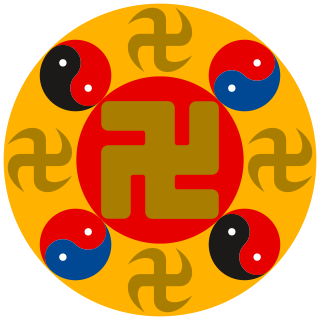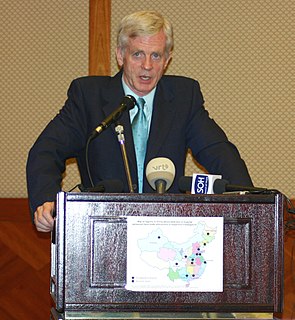Related Research Articles

Falun Gong or Falun Dafa is a new religious movement. Falun Gong was founded by its leader Li Hongzhi in China in the early 1990s. Falun Gong has its global headquarters in Dragon Springs, a 400-acre (160 ha) compound around Cuddebackville in Deerpark, New York, near the current residence of Li Hongzhi. Falun Gong's performance arts extension, Shen Yun and two closely connected schools, Fei Tian College and Fei Tian Academy of the Arts, also operate in and around Dragon Springs.

Laogai, short for laodong gaizao (劳动改造), which means reform through labor, is a criminal justice system involving the use of penal labor and prison farms in the People's Republic of China (PRC) and North Korea (DPRK). Láogǎi is different from láojiào, or re-education through labor, which was the abolished administrative detention system for people who were not criminals but had committed minor offenses, and was intended to "reform offenders into law-abiding citizens". Persons who were detained in the laojiao were detained in facilities that were separate from those which comprised the general prison system of the laogai. Both systems, however, were based on penal labor.

Re-education through labor, abbreviated laojiao was a system of administrative detention in Mainland China. Active from 1957 to 2013, the system was used to detain persons who were accused of minor crimes such as petty theft, prostitution, and trafficking illegal drugs, as well as political dissidents, petitioners, and Falun Gong followers. It was separate from the much larger laogai system of prison labor camps.
Re-education camp may refer to:

The 610 Office is, or was, a security agency in the People's Republic of China. Named for the date of its creation on June 10, 1999, it was established for the purpose of coordinating and implementing the persecution of Falun Gong. Because it is a Chinese Communist Party-led office with no formal legal mandate, it is sometimes described as an extralegal organisation. The 610 Office is the implementation arm of the Central Leading Group on Dealing with the Falun Gong (CLGDF), also known as the Central Leading Group on Dealing with Heretical Religions. In March, 2018, the office was reorganized and its functions delegated to the Central Political and Legal Affairs Commission and the Ministry of Public Security.
Freedom of religion in China may be referring to the following entities separated by the Taiwan Strait:

Falun Gong, also called Falun Dafa, is a spiritual practice and system of beliefs that combines the practice of meditation with the moral philosophy articulated by its founder, Li Hongzhi. It emerged on the public radar in the Spring of 1992 in the northeastern Chinese city of Changchun, and was classified as a system of qigong identifying with the Buddhist tradition. Falun Gong initially enjoyed official sanction and support from Chinese government agencies, and the practice grew quickly on account of the simplicity of its exercise movements, impact on health, the absence of fees or formal membership, and moral and philosophical teachings.
The Tiananmen Square self-immolation incident took place in Tiananmen Square in central Beijing, on the eve of Chinese New Year on 23 January 2001. There is controversy over the incident; Chinese government sources say that five members of Falun Gong, a new religious movement that is banned in mainland China, set themselves on fire in the square. Falun Gong sources disputed the accuracy of these portrayals, and claimed that their teachings explicitly forbid violence or suicide. Several journalists have suggested the self-immolations were staged.
Zhao Changqing is a history teacher and political activist in the People’s Republic of China.
Masanjia Labor Camp is a re-education through labor camp located in the Yuhong district near Shenyang, in the Liaoning province of China. The facility is sometimes called the Ideology Education School of Liaoning Province. It was first established in 1956 under China's re-education through labor, or laojiao policy, and was expanded in 1999 in order to detain and "re-educate" followers of the Falun Gong spiritual practice. According to former detainees, Falun Gong practitioners represent 50–80% of inmates in the camp. Other prisoners include petty criminals, prostitutes, drug addicts, petitioners, and members of other unapproved religious minorities, such as underground Christians.

The Laogai Research Foundation is a human rights NGO located in Washington, D.C, United States. The foundation's mission is to "gather information on and raise public awareness of the Laogai—China's extensive system of forced-labor prison camps."

The Kilgour–Matas report is a 2006/2007 investigative report into allegations of live organ harvesting in China conducted by Canadian MP David Kilgour and human rights lawyer David Matas. The report was requested by the Coalition to Investigate the Persecution of Falun Gong (CIPFG) after allegations emerged that Falun Gong practitioners were secretly having their organs removed against their will at Sujiatun Thrombosis Hospital, although an independent investigation found insufficient evidence to support the allegation. The report, based on circumstantial evidence, concluded that "there has been, and continues today to be, large-scale organ seizures from unwilling Falun Gong practitioners." China has consistently denied the allegations.

The Laogai Museum is a museum in Dupont Circle, Washington, D.C., United States, which showcases human rights in the People's Republic of China, focusing particularly on the Láogǎi, the Chinese prison system of "Reform through Labor". The creation of the museum was spearheaded by Harry Wu, a well-known Chinese dissident who himself served 19 years in laogai prisons; it was supported by the Yahoo! Human Rights Fund. It opened to the public on 12 November 2008, and Wu's non-profit research organization calls it the first museum in the United States to directly address the issue of human rights in China.

The persecution of Falun Gong is the antireligious campaign initiated in 1999 by the Chinese Communist Party (CCP) to eliminate the spiritual practice of Falun Gong in China, maintaining a doctrine of state atheism. It is characterized by a multifaceted propaganda campaign, a program of enforced ideological conversion and re-education and reportedly a variety of extralegal coercive measures such as arbitrary arrests, forced labor and physical torture, sometimes resulting in death.

Jennifer Zeng is a Chinese-born human rights activist and author, best known for her practice of Falun Gong, the subsequent government suppression of the movement, and the book she wrote about her experience regarding Falun Gong: Witnessing History: One Chinese Woman's Fight for Freedom and Falun Gong.
The Daqing re-education through labor camp is a re-education through labor camp located at 54 No. 22 Lane, Jingyi Street, Daqing, China.

Ethan Gutmann is an American writer, researcher, author, and a Senior Research Fellow in China Studies at the Victims of Communism Memorial Foundation whose work has investigated surveillance and organ harvesting in China.

Gao Rongrong was an accountant at an art college in Shenyang, China. She was dismissed in 1999 for practicing Falun Gong. Gao was reportedly sent to the Longshan Forced Labor Camp in July 2003.
There have been allegations of forced organ harvesting from Falun Gong practitioners and other political prisoners in China. According to a controversial report by former lawmaker David Kilgour, human rights lawyer David Matas and Ethan Gutmann of the US government think tank Victims of Communism Memorial Foundation, political prisoners, mainly Falun Gong practitioners, are being executed "on demand" in order to provide organs for transplant to recipients. Research undertaken by the Washington Post has contradicted these allegations, by showing that China does not import sufficient quantities of immunosuppressant drugs, used by transplant recipients, to carry out the alleged organ harvesting.